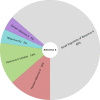Detection of G3 human-like rotavirus in institutionalized dogs from Brazil
- PMID: 37076753
- PMCID: PMC10234945
- DOI: 10.1007/s42770-023-00972-w
Detection of G3 human-like rotavirus in institutionalized dogs from Brazil
Abstract
Viral gastroenteritis is a common clinical problem in dogs and group A rotavirus (RVA) is one of the agents involved in this etiology. It mainly affects dogs in the first 6 months of life, and these animals are considered an important reservoir and potential transmitters of the virus to other susceptible hosts, such as humans. Among the different types of RVA, G3 is the most detected in dogs, and this genotype is also involved in infections in other animals, including humans. Thus, the present study aims to investigate the presence of RVA in samples of dogs from a public kennel. A total of 64 fecal samples from dogs with diarrhea were analyzed, collected from April 2019 to March 2020, from the kennel of the Zoonosis Control Center, located in Belém, a city in the North of Brazil. The extracted genetic material was subjected to reverse transcription followed by real-time PCR (RT-qPCR); the positives were tested by RT-PCR with a specific primer for the RVA VP7 gene, after nucleotide sequencing and phylogenetic analysis. One sample was subjected to high-performance sequencing. A positivity of 7.8% (5/64) was observed for RVA, all characterized as G3, grouping in the G3-III lineage, with greater similarity to human samples. Different regions of the RVA genome fragments were found. These results emphasize the need for animal health surveillance to better understand the global strain dispersion of RVA and elucidate possible interspecies transmission events, monitoring the genetic diversity of this pathogen.
Keywords: Canine; Diarrhea; Gastroenteritis; Zoonosis.
© 2023. The Author(s) under exclusive licence to Sociedade Brasileira de Microbiologia.
Conflict of interest statement
The authors declare no competing interests.
Figures


References
-
- Aguiar TDF, Teixeira MFS, Dias RP, Peixoto RM, Alves AO. Importância zoonótica de rotaviroses oriundas de cães (Canis familiaris) Revista Brasileira de Higiene e Sanidade Animal: RBHSA. 2016;10(3):510–528. doi: 10.5935/1981-2965.20160043. - DOI
-
- Friesema IH, De Boer RF, Duizer E, Kortbeek LM, Notermans DW, Smeulders A, Bogerman J, Pronk MJ, Uil JJ, Brinkman K, Koopmans MP, Kooistra-Smid AM, Van Duynhoven YT, GEops Working Group Aetiology of acute gastroenteritis in adults requiring hospitalization in The Netherlands. Epidemiol Infect. 2012;140(10):1780–6. doi: 10.1017/S0950268811002652. - DOI - PubMed
-
- Charoenkul K, Janetanakit T, Bunpapong N, Boonyapisitsopa S, Tangwangvivat R, Suwannakarn K, Theamboonlers A, Poovorawan Y, Amonsin A. Molecular characterization identifies intra-host recombination and zoonotic potential of canine rotavirus among dogs from Thailand. Transbound Emerg Dis. 2021;68(3):1240–1252. doi: 10.1111/tbed.13778. - DOI - PubMed
MeSH terms
LinkOut - more resources
Full Text Sources
Medical
Miscellaneous

